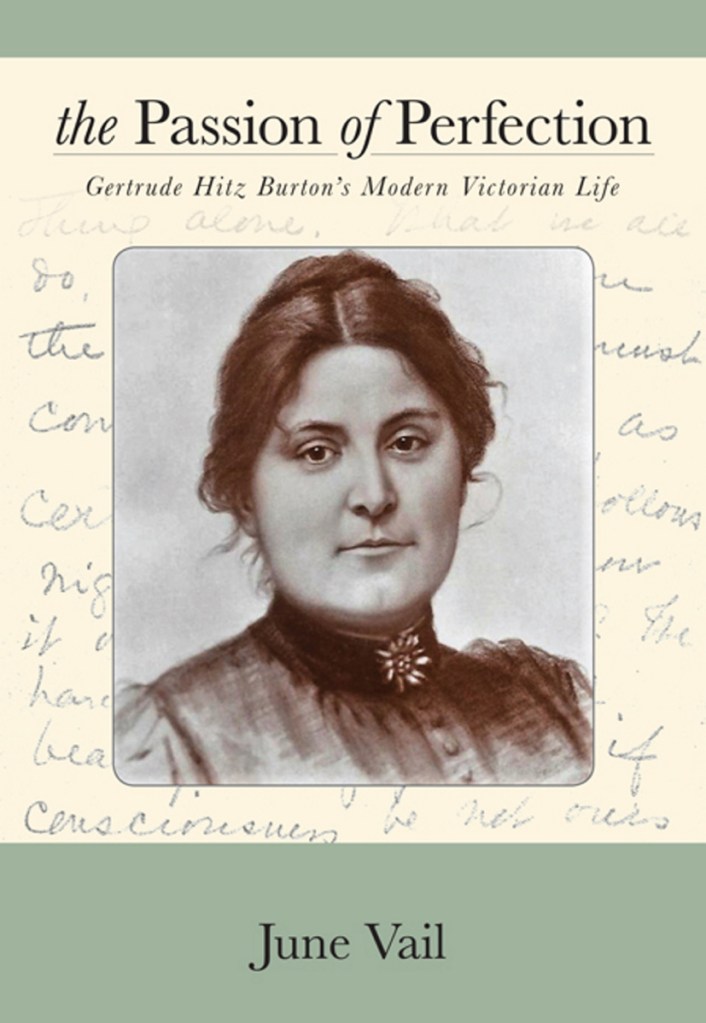If readers have not come across the name Gertrude Hitz Burton, (1861-1896), that is no surprise, unless he or she is a deep delver into the lives of 19th-century worthies, including art connoisseur Bernard Berenson, Arctic explorer Robert E. Peary and noted Canadian poet laureate William Bliss Carman. June Vail begins her informative, sprightly new biography, “The Passion of Perfection: Gertrude Hitz Burton’s Modern Victorian Life,” with a quote from George Eliot’s “Middlemarch” that is suitable to Burton’s singular life: “The effect of her being on those around her was incalculable diffusive; for the growing good of the world is partly dependent on unhistorical act.”

In “The Passion of Perfection,” June Vail, a professor of theater and dance at Bowdoin College and great-granddaughter of Burton, hits all the right notes, giving her subject a full-bodied life story and vivid and important historical context.
The daughter of Swiss diplomat John Hitz and his strong-minded American wife, Jane Shanks, Gertrude was an attractive, much-loved child who spent her early years on both sides of the Atlantic. Born in Washington, D.C., she was what contemporary Victorian psychologist Henry Goddard would have termed a “gifted child.” In 1877, Gertrude was enrolled in Wilson College in Chambersburg, Pennsylvania, whose brochure proclaimed, “The pupils will learn to think for themselves and thus become leaders instead of followers in society.”
Sadly, Burton was forced to leave a semester short of graduation after her father was caught up in a financial scandal involving the Swiss Consulate. In 1880, she became a school teacher in the District of Columbia. Her father was left in financial ruin, though his friends rallied to his defense, and inventor Alexander Graham Bell soon gave him a job. Hitz’s wife left him and moved to Deer Isle. The scandal and subsequent breakup of her parents had a lasting effect on Burton, who remained close to both.
The connections in this book are amazing. Burton became fast friends with several young people on the move in Washington. Among the semi-established, semi-bohemian crowd were two Portlanders involved with the Coast and Geodetic Survey, Robert Peary and Alfred Edgar Burton, Bowdoin grads who each went by the name of Bert.
In the early 1880s, Burton became a social and literary activist. Among her causes was the Moral Education Society, which promoted “voluntary motherhood” or “Alphaism,” a belief that “childbearing was the root of woman’s oppression.” Its motto was “Every child a wanted child.” In 1884, Burton wrote a pamphlet published by the Alphaists titled “The Importance of Knowledge Concerning the Sexual Nature. A Suggestive Essay.” Later that year, she married Burton and began to raise a family.
The rest of the book is a study in Victorian life and letters that takes us to Maine, New York state and Europe. As Burton’s health declined, she sought restorative help with Portland physician, Dr. Frederic Gerrish at Maine General Hospital, and then at health spas and sanatoriums across the Atlantic. It was a long, valiant downward spiral with scant interest or help from her husband, probably the only one of her circle to lose interest in her. Indeed, the year Burton passed away in Switzerland, her husband became a full-time professor at MIT and went on to distinction.
“Gertrude’s generation still cherished the Victorian virtues of good character, moral integrity, loyalty and self-discipline,” Vail notes. “Humankind’s moral perfectibility was the grand idea that inspired Gertrude’s life’s work.”
Though never famous, Gertrude Hitz Burton was very much a part of the literary and cultural landscape, including that of Maine, and the reader and historian is grateful for surprising new ideas and connections that illuminate the larger scene through her work and person.
William David Barry is a local historian who has authored/co-authored seven books, including “Maine: The Wilder Side of New England” and “Deering: A Social and Architectural History,” He is writing a history of the Maine Historical Society. He lives in Portland.
Send questions/comments to the editors.



Success. Please wait for the page to reload. If the page does not reload within 5 seconds, please refresh the page.
Enter your email and password to access comments.
Hi, to comment on stories you must . This profile is in addition to your subscription and website login.
Already have a commenting profile? .
Invalid username/password.
Please check your email to confirm and complete your registration.
Only subscribers are eligible to post comments. Please subscribe or login first for digital access. Here’s why.
Use the form below to reset your password. When you've submitted your account email, we will send an email with a reset code.